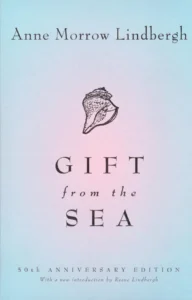The Beach and the Soul: Anne Morrow Lindbergh on the Benedictions of the Sea
INSPIRATIONAL, 5 Aug 2024
Maria Popova | The Marginalian – TRANSCEND Media Service
 “Without a body there’s no soul and without the latter there’s no way to speak about the sea,” the poet, painter, and philosopher Etel Adnan wrote in her superb meditation on the sea and the soul. “No one could write truthfully about the sea and leave out the poetry,” Rachel Carson insisted. Because the beach is where the body meets the sea, it is a place of encounter with the native poetry of the soul — a place to be “washed of all the excrescences of so-called civilization, which includes the incapacity to be happy under any circumstances,” as Anaïs Nin observed in contemplating the beach as training ground for presence. It was on the beach alone at night that Walt Whitman touched eternity.
“Without a body there’s no soul and without the latter there’s no way to speak about the sea,” the poet, painter, and philosopher Etel Adnan wrote in her superb meditation on the sea and the soul. “No one could write truthfully about the sea and leave out the poetry,” Rachel Carson insisted. Because the beach is where the body meets the sea, it is a place of encounter with the native poetry of the soul — a place to be “washed of all the excrescences of so-called civilization, which includes the incapacity to be happy under any circumstances,” as Anaïs Nin observed in contemplating the beach as training ground for presence. It was on the beach alone at night that Walt Whitman touched eternity.
One summer in the early 1950s, Anne Morrow Lindbergh (June 22, 1906–February 7, 2001) left her husband and five children home in the suburbs of New York City and headed for beach in search of communion with her own soul. In Gift from the Sea (public library), in lovely prose winged with the poetic, she channels what she found through the patient work of surrender and shimmering receptivity.

Lindbergh writes:
The beach is not the place to work; to read, write or think… Too warm, too damp, too soft for any real mental discipline or sharp flights of spirit… The books remain unread, the pencils break their points and the pads rest smooth and unblemished as the cloudless sky. No reading, no writing, no thoughts even—at least, not at first.
At first, the tired body takes over completely… One is forced against one’s mind, against all tidy resolutions, back into the primeval rhythms of the seashore. Rollers on the beach, wind in the pines, the slow flapping of herons across sand dunes, drown out the hectic rhythms of city and suburb, time tables and schedules. One falls under their spell, relaxes, stretches out prone. One becomes, in fact, like the element on which one lies, flattened by the sea; bare, open, empty as the beach, erased by today’s tides of all yesterday’s scribblings.

But this elemental surrender does not come easily, or quickly, to the captive of civilization and all its deadening compulsions of productivity — it takes time to surrender. For Lindbergh, in an era when airplanes were young and the Internet unborn, that time was two weeks. I wonder what the technology-induced inflation would be today.
She writes:
And then, some morning in the second week, the mind wakes, comes to life again. Not in a city sense — no — but beach-wise. It begins to drift, to play, to turn over in gentle careless rolls like those lazy waves on the beach. One never knows what chance treasures these easy unconscious rollers may toss up, on the smooth white sand of the conscious mind; what perfectly rounded stone, what rare shell from the ocean floor. Perhaps a channelled whelk, a moon shell or even an argonaut.

In a caveat central to every meditation practice and every true unbidden love, she adds:
But it must not be sought for or — heaven forbid! — dug for. No, no dredging of the sea bottom here. That would defeat one’s purpose. The sea does not reward those who are too anxious, too greedy, or too impatient. To dig for treasures shows not only impatience and greed, but lack of faith. Patience, patience, patience, is what the sea teaches. Patience and faith. One should lie empty, open, choiceless as a beach — waiting for a gift from the sea.
Complement with Rachel Carson on the ocean and the meaning of life, then revisit Lindbergh on embracing change in relationships.
_______________________________________
 My name is Maria Popova — a reader, a wonderer, and a lover of reality who makes sense of the world and herself through the essential inner dialogue that is the act of writing. The Marginalian (which bore the unbearable name Brain Pickings for its first 15 years) is my one-woman labor of love, exploring what it means to live a decent, inspired, substantive life of purpose and gladness. Founded in 2006 as a weekly email to seven friends, eventually brought online and now included in the Library of Congress permanent web archive, it is a record of my own becoming as a person — intellectually, creatively, spiritually, poetically — drawn from my extended marginalia on the search for meaning across literature, science, art, philosophy, and the various other tendrils of human thought and feeling. A private inquiry irradiated by the ultimate question, the great quickening of wonderment that binds us all: What is all this? (More…)
My name is Maria Popova — a reader, a wonderer, and a lover of reality who makes sense of the world and herself through the essential inner dialogue that is the act of writing. The Marginalian (which bore the unbearable name Brain Pickings for its first 15 years) is my one-woman labor of love, exploring what it means to live a decent, inspired, substantive life of purpose and gladness. Founded in 2006 as a weekly email to seven friends, eventually brought online and now included in the Library of Congress permanent web archive, it is a record of my own becoming as a person — intellectually, creatively, spiritually, poetically — drawn from my extended marginalia on the search for meaning across literature, science, art, philosophy, and the various other tendrils of human thought and feeling. A private inquiry irradiated by the ultimate question, the great quickening of wonderment that binds us all: What is all this? (More…)
Go to Original – themarginalian.org
Tags: Inspirational, Oceans, Poetry, Spirit soul, Spirituality
DISCLAIMER: The statements, views and opinions expressed in pieces republished here are solely those of the authors and do not necessarily represent those of TMS. In accordance with title 17 U.S.C. section 107, this material is distributed without profit to those who have expressed a prior interest in receiving the included information for research and educational purposes. TMS has no affiliation whatsoever with the originator of this article nor is TMS endorsed or sponsored by the originator. “GO TO ORIGINAL” links are provided as a convenience to our readers and allow for verification of authenticity. However, as originating pages are often updated by their originating host sites, the versions posted may not match the versions our readers view when clicking the “GO TO ORIGINAL” links. This site contains copyrighted material the use of which has not always been specifically authorized by the copyright owner. We are making such material available in our efforts to advance understanding of environmental, political, human rights, economic, democracy, scientific, and social justice issues, etc. We believe this constitutes a ‘fair use’ of any such copyrighted material as provided for in section 107 of the US Copyright Law. In accordance with Title 17 U.S.C. Section 107, the material on this site is distributed without profit to those who have expressed a prior interest in receiving the included information for research and educational purposes. For more information go to: http://www.law.cornell.edu/uscode/17/107.shtml. If you wish to use copyrighted material from this site for purposes of your own that go beyond ‘fair use’, you must obtain permission from the copyright owner.
Join the discussion!
We welcome debate and dissent, but personal — ad hominem — attacks (on authors, other users or any individual), abuse and defamatory language will not be tolerated. Nor will we tolerate attempts to deliberately disrupt discussions. We aim to maintain an inviting space to focus on intelligent interactions and debates.